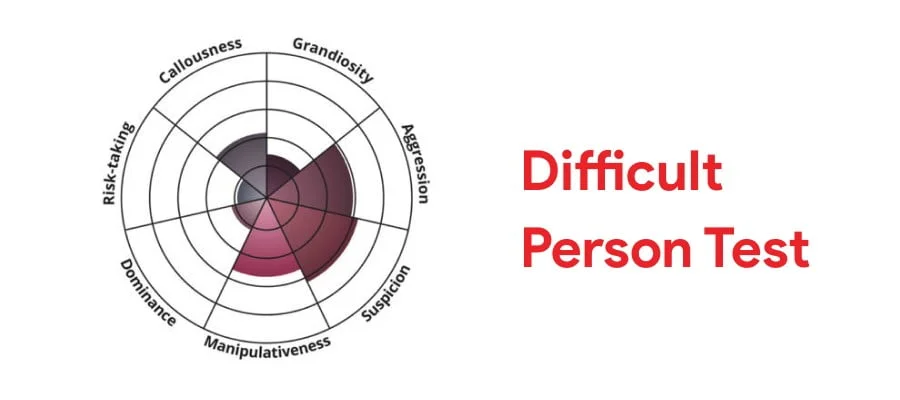Difficult Person Test: Many of the cultures of the world contain expressions for people whom it is difficult for them to communicate with. Chelsea Sleep and her colleagues at the University of Georgia now believe they have the ability to quantify scientifically the seven components that make up the characteristics of a difficult person test.
How to Explain Difficult Person Tests

The Difficult Person Test (characterized: DPT) is an assortment of self-report mental questions that determine how agreeable with, caring, respectful and socially sociable an individual is. The first quizzes were based on the findings of Dr. Sleep and her team’s research on personality disorders for their questions. There are other formats accessible, too.
While the purpose is to gauge the level of agreement of an individual however, a typical DPT is able to do more. The test you will find on this page shows the degrees of social apathy and antagonistic behavior and also.
Why do we use this difficult person Test?

1. The test is free
Difficult Person test assessment is provided to you free of the requirement to sign up or register and lets you get your scores relating to the degree of grandiosity, apathy, callousness and suspiciousness. It also measures manipulativeness, suspicion as well as domination and taking risks.
2. Affects the patient’s clinical condition.
The feedback provided via this tool is founded on research by Ph.D.s as well as designed by them to give clear and precise clinical information about the individual’s characteristics that indicate the presence of antagonism based on the standardized items.
3. Controls based on statistics.
The statistical examination of test scores is performed to ensure the greatest accuracy and reliability of test results.
4. Professionals have created the test.
This test was created by a team of experts who are experts in the study of individual differences and psychology.
Have you completed the Difficult Person Test?
A friend of mine sent it to me and I then sent it to my friends. The majority of us brushed off the question -The answers were straightforward. However, we all got slightly different scores. While most (including me) were with the “easy to be around” side I was awed by the different scores for the seven traits that were highlighted:

- Insensitivity
- Grandiosity
- Aggressiveness
- Suspicion
- Manipulativeness
- Dominance
- Risk-taking
And, not only that, we all did not have an average score of 0%. This means that we’re not hard-working people at all. In the end, no matter how much you may think that you’re easy to be around it’s likely that you possess one or more of these annoying characteristics.
The Issue with Many Difficult Person Tests on the Internet
Block is a well-known personality researcher, is of the opinion that a lot of online tests are flawed because of the Jingle-Jangle issue. Different quality with identical labels as well as various labels to describe the identical quality make it difficult to determine the accuracy of test questions.
In the case of DPTs, Jingle Jangle terms like antagonism, psychopathy, and sociopathy can negatively impact the results. Additionally, the Difficult Personality Test must distinguish these types of tests.
Quiz Expo rely heavily on FFM along with Doctor. Sleep’s seven aspects of character complexity to provide exact results. Our quiz distinguishes psychopathy-related mental disorders from PDs and other human characteristics that are not considered to be casual.
What happens if the test says You’re a Struggling Person?
A study from 2017 proved that individuals who suffer from personality disorders are able to improve their lives regardless of the general assumptions. According to the research backed by the American Psychological Association, “Individuals who have PD characteristics tolerate, but do not like the traits they have, and believe they cause impairment, and are keen to reduce their impact.”
You might be thinking “How do I avoid becoming someone who is Difficult Person ?” Here are a few tips for being more friendly and more welcoming.
1. Fewer judgments, more questions.
Viktor Sander says, Agreeable people are open-minded and tolerant. Therefore instead of judging other people and asking them questions, you should inquire about them. Let them share their thoughts and goals.
2. Let your preconceptions go.
“Disagreeable people tend to hold false assumptions that make them seem unlikable,” says Sander in his 2021 piece. If you’re Difficult Person Test results were positive, it’s likely that you are a victim of these assumptions. Making statements like, “Everyone is stupid,” is an indication of a problem. You’re better off not making the premise if you’re looking to be like a person who is social.
3. Help others, without expectations.
You must learn to give and not necessarily expect to be rewarded. It is essential to appear friendly and likable. (But ensure that you don’t overdo it or let others misuse your generosity).
Conclusion:
You can take the difficult person test without blocking to determine whether you’re a tough subject or not. Most of these tests are no cost and are available as quizzes. Remember that these tests cannot provide a complete assessment. For that you need the guidance of an expert in mental health. This was the end of an exam for a difficult person I made every effort to give you valuable information and I’m hoping you find this useful.

